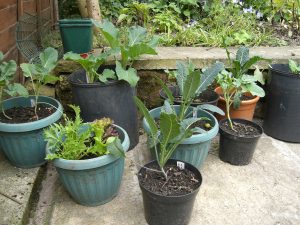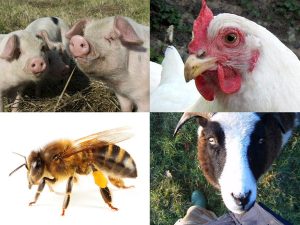Chickens - introduction

“Our chickens are ideal pets. They feed us more than we feed them.” – Amy Robach
Contents
What are chickens?
The chicken (Gallus gallus domesticus) is a domestic fowl, descended from the Red jungle fowl native to south-east Asia. Possibly domesticated as much as 8,000 years ago, it is one of the commonest and most widespread agricultural animals. Chickens are primary kept for eggs and meat, they can also provide pest control and manure.
Chickens are gregarious animals and naturally live in flocks. Established flocks will have a strict dominance hierarchy or ‘pecking order’ with the more dominant individuals having first access to resources such as food and preferred nesting boxes. Chickens are omnivorous and when allowed to do so will forage for plants, insects and even small mammals to eat. A chicken will naturally live 5 to 10 years, though the productive life for laying and breeding hens is usually far shorter.

Since domestication a bewildering number of different breeds have been developed. Some of these are suited to producing eggs, other to producing meat and some are dual purpose. Breeds also vary in their temperament, ability to fly, hardiness, whole lifespan, productive lifespan and tendency to sit on and hatch clutches of eggs.
What are the benefits of keeping chickens?
Chickens are adaptable and easy to keep. You can keep them in your garden and have fresh, ethically and sustainably produced eggs every day. On a larger scale chickens are a common starting point for the new smallholder. They are easy to raise and with sufficient space can forage for a large part of their food intake, helping clear land while they do so. They will also eat waste food (though there are some legalities you need to be aware of, see below).

In the garden you can use ‘chicken tractors’ to clear weeds and pests from the soil and you can use their manure for fertiliser. If you do most of your growing in the summer they can also be allowed to free range over winter, clearing your vegetable beds and eating slug eggs. On the smallholding, chickens can be kept with other animals where they will help reduce the levels of parasites on the pasture.
Chickens come in a fantastic range of shapes and sizes, they make funny, entertaining and pretty family pets as well as excellent sources of protein and fertilzer!

What can I do?
Getting started
There are plenty good resources online to get you started (see the links under resources, above, to start with). Many people keep chickens, if you can find a local chicken keeper it is worth paying them a visit and getting a feel for handling chickens.
For information on the different breeds and their characteristics see here or here. You might choose a pure breed or a named hybrid with the characteristics you want, or a ‘mix and match’ hybrid. The latter have less predictable characteristics but a wider gene pool can mean a healthier and productive life. Many people choose to give ex-battery or barn-kept hens a home and a second chance at life and most ex-battery hens will give you at least a few eggs.

Chickens are gregarious, it is essential that you keep at least 2 and they may be less stressed in a small flock of 3 or 4. The simplest option is to buy ‘point of lay’ hens (about 20 weeks old). Expect to pay £15-20 for a good quality pure breed or named hybrid. Alternatively you can buy day old chicks, which is cheaper, but, unless they are sexed, you need to consider how you will get rid of excess males.
If you cannot find the breed you want buying fertile eggs is also an option. Incubating and hatching eggs is not hard to do with a little research. Unless you have a broody hen you will need to buy an incubator and a heat lamp. You will need an indoor space for the chicks until they are ready to go outside, although this could be a draught-proof shed. See our links section for more sources of information.

Housing
Chickens need a weatherproof hen-house of roughly 30cm x 30cm per hen. The house will need dark, private nest boxes (at least one nest box per 3 birds), perches to roost on, a door for the hens, and a larger door for cleaning out. It must be secure from predators and shut up overnight. You can use straw, newspaper or shavings to line the floor of the house and nest boxes are usually lined with straw or shavings.

If you are not in a situation to allow your chickens to free range you can keep them in a pen, with either permanent or movable fences, or a movable run. A movable pen or run is advisable if you can manage it as rotating the location of your pen will reduce the chances of problems with parasites and disease. Some chickens are easily contained with a 3 ft fence while others develop the ability to fly over a 5 ft fence even with a clipped wing. This varies according to the breed and the individual but usually a 4 ft fence is enough to to contain chickens with clipped wings.
If you are relying on a fence for fox protection it should be 6 feet high and either dug into the ground at the base, or extending outward from the base across the ground for a couple of feet. Usually shutting chickens up at night is enough to keep them safe, but some foxes do discover there are easy meals to be had during the day.

Feeding
You can buy mash or pellets to feed your hens from agricultural suppliers. This is commercial compound feed, made of various grains (best to use feeds that don’t contain soya). Different feeds are available for different ages. Generally chick crumbs are given for the first 5 weeks, then grower’s mash or pellets until 18 weeks, then layer’s mash or pellets. ‘Mixed corn’ (actually a mix of wheat and corn) should only be fed in small amounts to laying hens; more can be given in the winter when hens are not laying.

With a little research it is possible to mix your own feed using grains, legumes, seeds, meal worms and vegetable scraps. This can be a way to reduce food miles and avoid ingredients you consider unsustainable. You need to make sure the feed has appropriate levels of calories, protein and calcium. You can make sure your hens get enough calcium by feeding oyster shell. Mixing your own feed is more likely to be a good option if your hens have the opportunity to range freely and forage for their own food. If your hens are modern hybrid egg-laying machines you may find that you need the carefully balanced compound feed to maintain them in a healthy condition.
It is now technically illegal to feed your chickens kitchen scraps. You can however legally feed your chickens raw vegetable scraps that have not been processed in your kitchen. As these tend to have a low protein content they should be fed in moderation.
You should always make sure your hens have access to grit and to clean water.

Health
Chickens need a dust bath to help them control external parasites such as lice and mites. You can either provide a box full of dry soil and sand, or a covered area where they can dig their own dust bath. Either way the dust bath must be protected from the rain so your hens can use it in all weathers. Adding diatomaceous earth to the dust bath can help protect your chickens from parasites. If your chickens do suffer from lice or mites you can add lice powder to their dust bath – this is far more effective and less stressful than trying to apply it directly yourself.
Red mite can be a particular problem in chickens, as the mites live in the chicken house and attack the chickens at night. You can prevent and treat red mite by regularly cleaning the chicken house with a pressure washer, special detergent and/or a steam cleaner. Pay special attention to cracks and crevices. Afterwards you can dust the house with diatomaceous earth or a mite powder (organic products are available). If the battle with red mite begins to sap your will to live you may want to consider buying a plastic house for your hens. Plastic houses don’t provide the same hospitable habitat for the mites.

It is generally recommended to ‘worm’ (treat for internal parasites) at least twice a year. You can control parasites to a certain extent using pasture rotation (or moving your chicken pen to a new location), picking up droppings, adding apple cider vinegar to the water, garlic to the feed and giving a ‘herbal’ wormer. These methods will not necessarily prevent or cure an infestation however. If you want to avoid chemical wormers, it is advisable that you perform a ‘faecal egg count’ regularly. You can do this yourself if you have a microscope, or you can buy a kit and send off a sample. In this way you only treat your chickens when necessary and avoid contributing to the problem of resistance to medications.
Meat production & slaughter
It is legal to slaughter chickens at home for consumption by yourself and your immediate family provided it is done humanely. If this is something you want to do, it is advisable to get the help of an experienced person or to attend a course on humane slaughter. See the Humane Slaughter Association for more information. Plucking and butchering are not difficult skills to learn and there are many online articles and videos to help you with this process.
For the smallholder, supplying small numbers of birds directly to consumers or to local retailers, it is also possible to slaughter and process your birds on farm, although you must register with your local authority. The humane slaughter association is a good source of information on methods, equipment and courses to attend.
If you plan to produce meat for sale and you slaughter the birds yourself, or send them to a slaughter house but take on the butchery yourself, you will need to follow hygiene regulations and have your premises inspected by Environmental Health on a regular basis. Contact the Food Standards Agency for further information.

Paperwork and regulations
You have to register with DEFRA and standard regulations apply if you keep more than 50 ducks / hens or a mix of both. There are no regulations for people keeping fewer than 50 birds.
If you keep fewer than 50 hens you can sell your eggs directly to consumers without being registered. This includes selling eggs from your home, door-to-door, or at a local market. If you sell at a local market you must display your name and address, a best-before date and advice to keep eggs chilled. You cannot sell eggs through a shop, or grade them by size without registration.
Specialist(s)
Thanks to Lesley Anderson of Permaculture Scotland for information.











